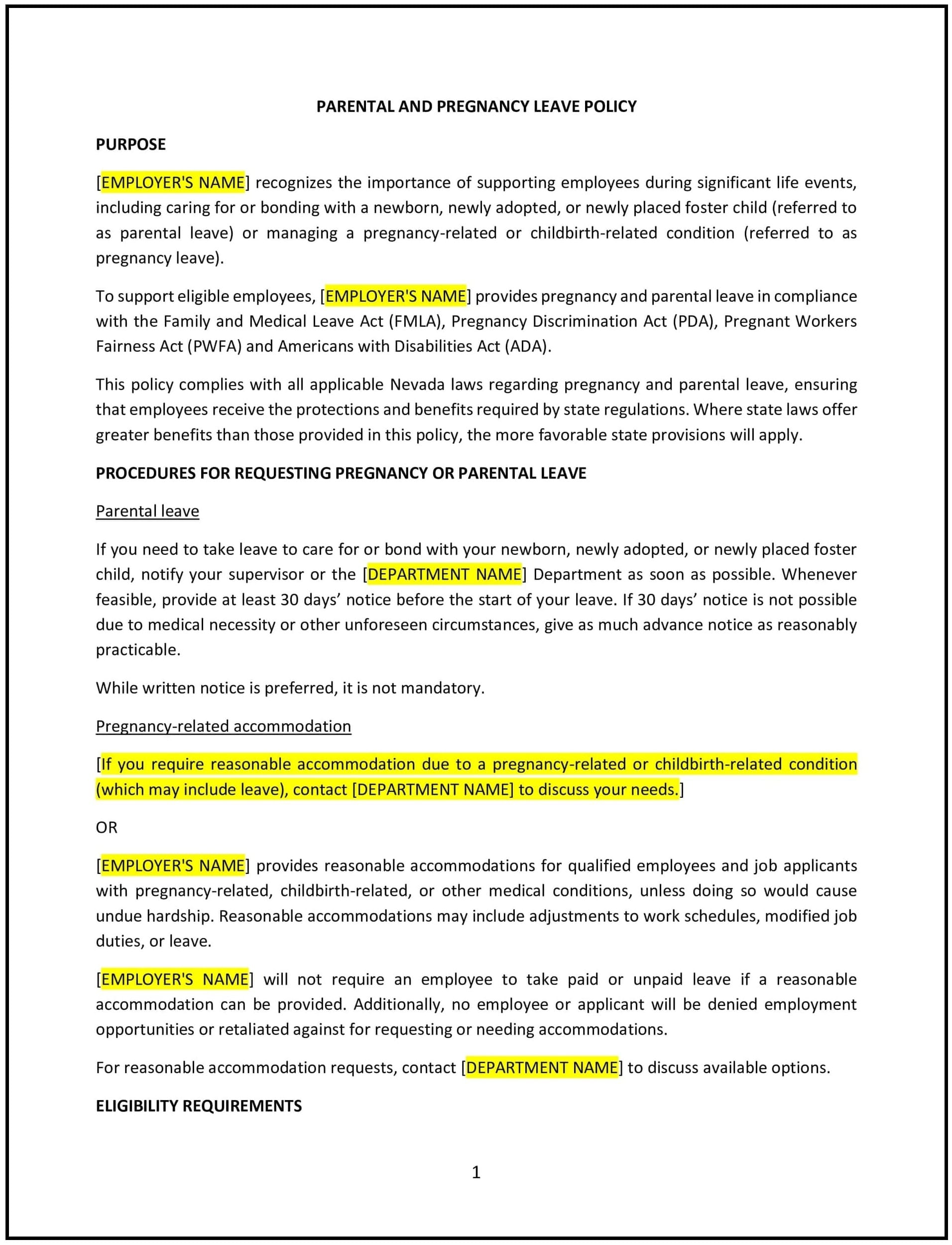Parental and pregnancy leave policy (Nevada): Free template
Got contracts to review? While you're here for policies, let Cobrief make contract review effortless—start your free review now.

Customize this template for free
Parental and pregnancy leave policy (Nevada)
This parental and pregnancy leave policy is designed to help Nevada businesses provide employees with clear guidelines for taking leave related to childbirth, adoption, and pregnancy-related medical needs. It outlines employee rights, employer responsibilities, and the procedures for requesting and managing leave in compliance with Nevada and federal laws, including the Family and Medical Leave Act (FMLA).
By adopting this policy, businesses can support employees during significant life events, improve compliance with legal requirements, and promote a family-friendly workplace culture.
How to use this parental and pregnancy leave policy (Nevada)
- Define eligibility: Specify which employees are eligible for parental and pregnancy leave, including factors such as length of employment and hours worked.
- Clarify leave duration: Outline the amount of leave available for pregnancy, childbirth, or adoption, referencing FMLA and Nevada state law requirements where applicable.
- Address paid and unpaid leave: Explain whether the leave is paid, unpaid, or a combination of both. Include details about using accrued paid time off (PTO) during the leave period.
- Establish notification procedures: Require employees to provide advance notice of their intent to take leave, including medical documentation or proof of adoption when applicable.
- Include job protection assurances: Emphasize that employees are entitled to return to their job or an equivalent position following parental or pregnancy leave, as required by law.
- Provide accommodations for pregnancy: Address reasonable accommodations for pregnancy-related medical needs, such as modified work duties or additional breaks.
- Detail health benefits continuation: Specify how health insurance and other benefits will be maintained during the leave period.
- Offer resources and support: Provide information about available resources, such as employee assistance programs (EAPs) or external support groups, for employees navigating parental or pregnancy leave.
Benefits of using this parental and pregnancy leave policy (Nevada)
This policy provides several benefits for Nevada businesses:
- Improves legal compliance: Aligns with FMLA and Nevada state laws, minimizing the risk of legal disputes.
- Supports employee well-being: Provides a structured framework to help employees manage parental and pregnancy needs effectively.
- Promotes inclusivity: Fosters a family-friendly workplace culture, enhancing employee satisfaction and loyalty.
- Reduces turnover: Encourages employee retention by supporting individuals during critical life events.
- Enhances workplace morale: Demonstrates a commitment to employee needs and promotes a supportive work environment.
Tips for using this parental and pregnancy leave policy (Nevada)
- Communicate the policy: Ensure employees are aware of their rights and responsibilities under the policy, including eligibility criteria and notification requirements.
- Encourage early discussions: Prompt employees to discuss their leave needs with HR or their manager as early as possible for effective planning.
- Maintain records: Keep detailed records of leave requests, approvals, and related documentation to improve compliance with legal requirements.
- Train managers: Provide training for managers to handle parental and pregnancy leave requests sensitively and in compliance with the law.
- Update regularly: Review the policy periodically to reflect changes in state and federal laws or company practices.